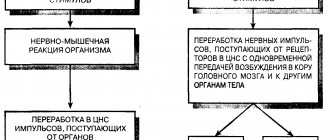Sometimes, when life throws another dirty trick on us, and problems surround us on all sides, we want to be back in childhood. It’s calm, warm, cozy there, and mom and dad will protect you from any troubles. The subconscious desire to return to the comfortable and safe world of childhood activates the protective mechanism of the psyche, called “regression” - returning back. This psychological defense, described by S. Freud, often becomes the last straw that a person grabs.
Definition
In experimental psychology, the term regression refers to the process by which, under certain circumstances, behavior habitual in a given situation gives way to behavior characteristic of an earlier stage of development.
According to Anna Freud, this is a defense against anxiety that a person’s subconscious uses, returning him to an earlier stage of development, when everything was good and calm. Regression in psychology is a trend that can be observed at any age from childhood to old age.
When a new brother or sister appears, the eldest child in the family unconsciously tries to regain the attention of the parents, which can be expressed by behavioral regression - they begin to ask for a bottle of milk, or rock them, suck their thumb. Teenagers who cannot solve their emotional problems sometimes resort to crying or throwing tantrums to get what they want.
Adults sometimes become helpless and indecisive in the face of the burden of problems that have fallen on them. A person experiencing a midlife crisis, moving away from an unconscious fear of aging, begins to behave recklessly, returning to the teenage stage.
A number of psychologists, based on clinical practice, have written about the usefulness of regression in a psychoanalytic situation:
- Sigmund Freud introduced the idea of bringing the unconscious into the conscious in the process of healing, and he is considered the founder of modern regression therapy.
- Michael Balint, Hungarian-British psychiatrist, specialist in group psychoanalysis, worked from 1921 to 1968. He used the regression process in psychoanalysis and believed that this process should move to the stage preceding the injury. Only in this case is it possible to begin anew the development of personality.
- In the 1950s, British psychiatrist Alexander Cannon regressed more than 1,400 patients with symptoms that could not be treated with conventional methods, observing significant improvement. By the end of the 60s and 70s of the last century, the use of hypnosis for the purpose of returning to previous age-related situations became generally accepted in the medical profession.
- Denis Kelsey, a British psychiatrist who widely used the regression method in the 1960s, came to the conclusion that past lives may be the cause of some psychiatric problems.
- Ernst Chris, an American psychoanalyst of the first half of the 20th century, wrote that the process of regression is very important in a psychoanalytic situation, when it is necessary to force a person to interact with the outside world through the prism of subconscious images.
- John Steiner, a modern psychoanalyst, introduced the concept of “psychic asylums.” The internal refuges that his patients use are necessary, first of all, in order to avoid suffering, to escape from traumatic events that occurred in the past.
- Vygotsky L.S., a Soviet psychologist who worked in the first half of the 20th century, defined regression as the collapse of the mediated structure of behavior and thinking.
Many psychologists understand the phenomenon of regression as various processes. Some insist that this depressive position is due to pathology, while others argue that it is a developmental process.
Summarize:
Regression therapy (regression therapy) is an effective technique for healing the Soul and body from a wide range of negative phenomena of past and present life, and regressologists are its guides for people . Whether you believe in the method or not is up to you. Do regressions work? Reviews will tell you about this better than any words.
Now I am a practicing regressologist, but at the beginning of my journey I myself experienced a bit of skepticism, like, how can one even see oneself in a past life, much less find any answers there, but research interest and the desire to search for the truth prevailed and, as it turned out, not at all in vain (in the first regression session there was a real catharsis followed by a re-awareness of my whole life).
With the help of the online regression therapy center “Connection of Souls” that I opened (where you are now), we can help dozens of people a month, we also explore everything new and unknown through human consciousness and post the results and our interpretations of the information received (in within acceptable confidentiality) in a video blog on YouTube ( Alexander Tsarev ). Here we are gradually collecting an extensive base of Knowledge and possible solutions to problems. By the way, you can read about our mission on the page “About the project”
If you want to discuss the topic openly, ask questions, let’s chat in the comments to the post, and be sure to rate the material if you received useful information.
If you have a request, sessions and consultations are conducted in the format of a Skype meeting, follow the links to register or receive information.
Our regression hypnosis sessions page for those who need specialist help
Page about training to become a “regressologist” in our school of regressive hypnosis
Kinds
Regression in psychology is a primitive form of psychological defense, but it often occurs in people and does not always pass without a trace.
The effect of regression on a person depends on its type:
- Short-term regression . It passes without complications and is the most common type of reaction. It usually appears after overexertion, physical overload and as a short-term phenomenon helps a person survive stress, failure, and life’s troubles.
- Partial. The type of regression lasts longer and often has a deforming effect on human behavior. In rare cases, it leads to mental disorders. An example would be a person who uses his actual illness or the one that exists in his imagination as an object of pressure on others and requiring additional constant attention from them. This behavior often develops into hypochondria, when an individual constantly looks for signs of illness.
- Complete regression. Complete regression is sometimes observed in young and not so young people. Disorder occurs at the moment of psychological trauma, when a person, faced with life obstacles that are insurmountable according to his concepts, cannot find a way out of them and “escaps” to his childhood. Such people need psychiatric help. This type also occurs in people with advanced senile dementia.
Age regression
In this case, a person, while under hypnosis, seems to be returning to some period of his life. He remembers what happened then, down to the smallest detail - as if reliving those moments again.
Most often, people come to a hypnotist precisely so that he can “send” them back to childhood. And this is a very interesting phenomenon. In a state of trance, mentally healthy adults experience those forms of behavior that were characteristic of the early periods of childhood. And the perception of the world around us becomes the same as it was then.
But it is believed that in reality these phenomena are a reconstruction created by the psyche of an adult. Plus, even in the case of intensive regression therapy, consciousness retains a certain contact with reality.
Characteristics and properties
The term “defense mechanism” was coined by S. Freud. His daughter, Anna Freud, followed him in studying protective functions and suggested that a person protects himself not only from forbidden desires, but also from those who are a source of stress.
She also proved the positive role of protective functions, since they not only stop the disintegration of the personality, but also support the mental status of a person.
A. Freud developed the concept of defenses that complement the main mechanism of suppression and described additional defense mechanisms:
- Suppression.
Regression in psychology is one of the types of psychological defense - Crowding out.
- Insulation.
- Reactive education.
- Projection.
- Turning against yourself.
- Reversion.
- Destruction.
In the service of the ego
Ernst Kries supplements Freud's general formulations with the specific concept of "regression in the service of the ego" ... the specific means by which preconscious and unconscious material manifests itself in the mind of the creator." In this way, Chris opened the way for ego psychology to take a more positive view of regression. Carl Jung previously argued that “the patient's regressive tendency... is not simply a relapse into infantilism, but an attempt to achieve something necessary... a universal sense of childhood innocence, a sense of security, protection, reciprocity. love, trust." Chris, however, was concerned, rather, to differentiate how “Inspiration - ... in which the ego controls the primary process and puts it to its service - should be contrasted with the opposite ... state in which the ego is suppressed. primary process."
However, his view of regression in the service of the ego can easily be extended to a quasi-romantic image of the creative process in which “it occurs only in a firestorm of deep regression, during which the personality undergoes both. the dissolution of structure and reorganization when the genius becomes able to tear himself away from the traditional pattern which he has been forced to integrate through the identification required and imposed by the Oedipal constellation."
From here it was perhaps only a small step towards regression being seen as a positive good in the 1960s. "In this particular type of travel, direction we have to take it back
and
in
…. They will say that we have regressed and are recalled and are out of contact with them. Indeed, we have a long, long way to go to get back to reality.” However, the Jungians had already warned that “romantic regression means submission to the non-rational side, which must be paid for by the sacrifice of the rational and individual side”; and Freud, for his part, gloomily observed that “this extraordinary plasticity of mental development has no unlimited limitations in direction; it may be described as a special faculty of involution—regression—for it may well be that a later and higher level of development, once abandoned, cannot be reached again.”
Functions and role
As a person develops, he masters the correct, logical forms of responding to situations, and his type of behavior also changes. But some people return to primitive forms of response. This is how regression occurs, which in some cases bears fruit and the person gets what he wants.
Protective psychological measures help a person:
- Smooth out the consequences of negative phenomena, get out of them with minimal losses.
- Minimize damage from internal conflicts.
- Relieve stress for the purpose of self-preservation of mental health. If a person is not mature enough, then in the event of severe anxiety, neurosis and depression may develop, and ultimately personality degradation may occur.
Valid reasons for recourse
It’s another matter when a child has already overcome a new step in his development and suddenly suddenly goes back. Let’s say the baby actively began to sit up on his own, but after infectious diarrhea with hospitalization, he seemed to have forgotten everything. Why is this happening?
Young children are especially susceptible to the influence of negative factors that can lead to such a situation. The psychomotor development of a baby in the first three years of life occurs at cosmic speed: he masters various skills (first the ability to hold his head, then roll over, sit up, walk, eat with a spoon and drink from a cup, fall asleep independently, use the potty, get dressed), he develops speech , and then thinking. The load on a small organism is enormous, and any seemingly insignificant circumstances or actions can slow down or disrupt the development of just acquired conditioned reflexes and skills, and they will not be fully consolidated.
Forms of manifestations and physiology
Any stimuli: life situation, people, problems cause various reactions of the individual, which determine his subsequent behavior.
Response can take many forms:
- adequate;
- rational;
- reasonable;
- children's;
- primitive.
Regression in classical concepts is a psychological defense mechanism that an individual uses in his desire to avoid feelings of anxiety and at the same time moves to the early stages of libido development.
In this case, a person fixated on experiencing failures replaces complex tasks with more accessible and simple ones in the current situations, using familiar behavioral patterns.
- Infantilism. At the same time, the person shows personal immaturity, an attempt to escape the need to solve problems and objectively evaluate circumstances.
- Jealousy. The inability to solve one’s problems often spills over onto a loved one. This can be jealousy not only towards another person, but also jealousy towards the fact that others are doing better in life.
- Aggression. It is often directed at a source that brought disappointment and caused offense.
- Autism. The person withdraws into himself and thus avoids solving problems.
- Hypochondria. At the same time, a person is so internally organized that internal illnesses become the subject of constant introspection and have a pessimistic overtones.
- Computer addiction. Often associated with a departure from adult life into the children's world on the screen.
- Narcissism. In this state, people are able to notice shortcomings in other people without observing them in themselves.
- Passion for superstitions. A person begins to look for the causes of his troubles in God’s punishment, the generational curse. This is a form of shifting responsibility to others.
Journey into the past
This is an even more interesting topic. There is such a thing as past life regression. This is the name of a special technique for using hypnosis. It aims to detect people's memories of reincarnation or their past lives.
The therapist asks the patient a series of specific questions. This is necessary in order to detect and identify events that happened in a past life. Critics believe that everything voiced by patients is a figment of fantasy, a reaction to the hypnotist’s suggestions, or simply confabulation.
Defense Mechanism Methods
Sigmund Freud was the first to address the concept of a psychological defense mechanism.
He formed a model of the psyche:
- “I” is the conscious area that regulates the unconscious, while protective measures are used.
- “It” is an unconscious area, regulated by the conscious “I”, but subject to instincts and impulses.
- “Super-I” is the area of moral criteria in which the “I” is realized in accordance with moral requirements.
Regression causes further protective measures that are designed to preserve the “I” from harmful consequences.
Regression in psychology is one of the defense mechanisms; in addition to it, there is a whole set of tools that protect the psyche from traumatic experiences.
crowding out
It manifests itself in forgetting an unpleasant fact that caused discomfort.
The human psyche spends a large amount of energy to suppress the unpleasant moments experienced, since there is always a risk that they will break out. Repression, concealment, and suppression of desires often negatively affect the psyche and general health and require large amounts of energy from a person.
Substitution
The technique of this defense mechanism comes in second place after repression and is similar in structure to the process of repression. Only in this case a person does not drive his thoughts into the unconscious, but transfers them to another object. For example, a teenager who received a bad grade transfers his dissatisfaction to his parents.
Projection
A person unconsciously attributes his feelings and thoughts to other subjects. Desire is projected onto other people, like: “It’s not me who is bad, it’s them.” Thus, in order to get rid of guilt, a person projects his sins onto other people. For example, unreasonable jealousy can be an example of projection.
Introjection
It is expressed in the tendency to appropriate other people’s actions, thoughts, rules of behavior without trying to understand and rethink them. In this case, the person does not want and is not able to distinguish between what is really necessary and suitable for him, and what he wants himself.
Rationalization
Another way to cope with anxiety is to rationalize or distort reality in order to protect self-esteem. Having committed an unseemly act, a person tries to give it a logical explanation.
This applies not only to misconduct, but also to failure.
This type manifests itself as depreciation. A loser at work explains his actions by saying that he doesn’t like his job, but it is stable.
Sublimation
This tactic is seen by Freud as the only healthy strategy for curbing negative impulses. For example, sexual desires are sublimated into creativity: poetry, painting. This form helps a person get rid of the negative influence of negative instincts and belongs to a higher level of protection.
In this case, the energy of desires is transformed and directed into a normal instinctive channel. Under the influence of sublimation, many masterpieces were created in literature, painting, and music.
Insulation
If a person is unable to cope with a negative situation, he begins to distance himself from it, taking it outside of his personality. This helps him escape from daily thoughts about how to resolve the situation, but sometimes leads to a split personality.
Techniques used
The success of regression therapy largely depends on how the psychotherapist directs his patient's thoughts to a certain period of life. He can ask him about that time, tell him something about other people’s childhoods, or even share personal stories. Milton Erickson’s principle applies here: “If you need a man to tell about his brother, tell him about yours.”
The following techniques are also used:
- Contextual suggestion. The therapist focuses in his speech on words such as “remember”, “return”, “think about the past”.
- Double bind. For example: “You can go back to when you were 5 years old. But it is likely that this will be a later period – 10 years, for example.”
- Implied indication. Let’s say: “When you again feel like a little 5-year-old child, you will be able to remember the office in which you studied.”
Of course, the therapist operates with facts found out during the conversation with the patient. He uses his own memories, because these “memory anchors” are really capable of returning to the past.
Psychological theories and schools
Regression in psychology is a section that is recognized by many scientists in modern science. Many concepts and directions have been developed, and psychological schools have been created. One of the first was Sigmund Freud. To explain the role of the unconscious in human life, he proposed a psychoanalytic approach. The teachings of S. Freud were developed and supplemented by numerous followers.
- School of objective psychology. Adherents of this direction propose to direct efforts to study the behavior, reactions, and reflexes of the individual. The forerunners of objective psychology are B. Pascal and V. M. Bekhterev.
- School of humanistic psychology. It began to develop in the 50s of the last century. The main representatives are American psychologists K. R. Rogers and A. Maslow. The focus was on the problem of personality and its development. Representatives of this school, in addition to psychoanalysis, paid great attention to consciousness and self-awareness, helped a person realize himself as a full-fledged person, and focused on the positive aspects of a person.
- Functional psychology. Representatives of this school, the Frenchman T.A. Ribot, Russian psychologist N.N. Lange considered psychology as the science of the functions of consciousness. Their works contain research on problems of perception, attention, and thinking. They emphasized the need to create experimental psychology.
- Depth Psychology . The concept was introduced by the Swiss psychiatrist E. Bleuler, who collaborated with S. Freud. A direction in which great importance is attached to the unconscious feeling located in the depths of the psyche, hidden behind the surface of consciousness.
In modern Russian psychology, much attention is paid to the problems of the physical function of the brain, which reflects objective reality. Scientists are trying to find out the nature and driving forces of the mental properties of a person, to resolve the problem of the “internal and external” world of a person.
Lots of meanings!
But not only in psychology, regression is also considered in esoteric teachings. This is typical primarily for those devoted to immersion in past lives. According to experts in this field, the term is usually understood as transvisualization.
To some extent, this phenomenon is similar to lucid dreaming, but at the same time it has specific differences. A person, moving into such a state, completely retains control of his own consciousness, but can get out of it without much effort. Immersion for this state is typically relatively weak. On the one hand, there are no sensations or details inherent in a classic full-fledged sleep, but at the same time a person gets a general idea. You can compare this to peeping through a crack. Many people believe that the degree of perception is determined by the quantity and quality of training.
You can go through regression either on your own, alone, or in a group of interested people gathered in one place and for one purpose. In large cities, such events are regularly organized for those interested. Special sounds are used. A division into levels is accepted, each of which is selected for a specific situation at the discretion of the most responsible and experienced group member or coach.
Diagnostics
The tests are carried out by specialists who have undergone special training or by psychotherapists working in medical clinics. The testing procedure takes about 1–2 hours, and decoding from 8 to 10 hours.
| Type of test | Procedure |
| Rorschach test | Projective inkblot test. The researcher shows drawings in which figures are marked with ink spots. The subject must answer what he sees on each card, what image appears in his mind, all the patient’s words and actions are noted. Examinations are carried out in healthy children, adults, children with developmental delays, patients with brain tumors, and schizophrenia. |
| Thematic Apperception Test (TAT) | It is a set of 31 tables presented in the form of black and white photographs on white cardboard. The subject must create a narrative story based on the images. Testing is used in the initial stages of individual psychotherapy, especially when urgent, emergency assistance is required, for example, in patients with suicidal tendencies. |
| Plutchik Questionnaire | It is a three-dimensional model of emotions, which contains questions that describe people’s feelings, behavior and reactions. Based on the answers, a life style index model is compiled. |
To date, there is not a single computer program that can reliably interpret test results. All test results must be explained by specialists. Tests can be found on the Internet, but results calculated independently will be greatly distorted.
You should not blame anyone for displaying “childish” behavior. We must remember that regression is a natural reaction of the body to excessive stress. The mechanism of its action is at the subconscious level and a person cannot always control his behavior. When short-term regression begins, it is worth seeking help from a psychologist at an early stage.
Indications
Age regression therapy is used to solve a variety of psychological problems. Here's why it's needed:
- Searching for the causes of a symptom (for example, stuttering or a nervous tic), if there is an assumption that its appearance is associated with some events from the person’s past. Once it is determined why it occurs, it will be easier to eliminate it through various therapeutic techniques.
- Return to a period when a person did not suffer from a problem that bothers him in the present time. Or at the moment when he successfully overcame it. This will help the person believe that they have the abilities needed to fix the problem. Also, this technique can help him understand what exactly helped him out and contributed to the improvement of his condition. In this case, regression therapy helps to restore motivation and self-confidence.
- Treatment of phobias. So, for example, if a person is afraid of flying on an airplane, then the hypnotist will help “return” him to the moment when the flight ended safely. The patient will experience that state of security and peace and remember it.
- Treatment of depression. A person, “returning to the past,” will be able to get rid of dysfunctional patterns of behavior. They are often the basis of depressive disorder.
By the way, there are cases when regression turns out to be spontaneous. And the psychotherapist, on the contrary, has to treat her. In such cases, the doctor teaches you to control the experiences and emotions that this phenomenon causes. Spontaneous regression occurs, usually due to some kind of psychological trauma.











